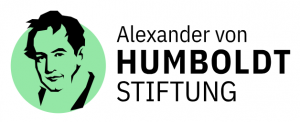Appel à nominations : Alexander von Humboldt Professorship
International Award for Research in Germany

The Humboldt Professorship is financed by the Federal Ministry of Education and Research. It enables the holder to conduct forward-thinking, long-term research at universities and research institutions in this country and makes a sustainable contribution to Germany’s ability to compete internationally as a location for research. Since 2008, up to ten Humboldt Professorships have been granted every year as part of the International Research Fund for Germany. In 2020, additional Alexander von Humboldt Professorships for Artificial Intelligence (AI) were created.
- Dossier Humboldt Professorship - Award winners and background information
- Humboldt Professorship - Programme Information (PDF, 42 KB)
- Humboldt Professorship for Artificial Intelligence - Programme Information KI (PDF, 145 KB)
- Information on the cross-disciplinary programme scope of AI (PDF, 115 KB)
- Recently selected Humboldt Professors
WANTED: Alexander von Humboldt Professors (female)
The Alexander von Humboldt Foundation is keen to award more Alexander von Humboldt Professorships to women academics. In the last 12 years, the share of top female researchers nominated for Germany’s most valuable research award to date was approximately 15 percent. The behavioural ecologist Margaret Crofoot has been an Alexander von Humboldt Professor at the University of Konstanz since 2019. For the American, being in a minority of women in world-class research is a novel experience. A multimedia reportage on Crofoot’s research into the group behaviour of humans and apes as well as her experience of Germany as a location for research:
https://humboldt-foundation.pageflow.io/portrait-meg-crofoot#277720
Focus: Artificial Intelligence
As a contribution to the German Government’s Artificial Intelligence Strategy, up to 2024, 30 additional Alexander von Humboldt Professorships are being established in the field of artificial intelligence (AI). Researchers from all research areas who address the investigation and use of AI as well as its impact on society are eligible to be nominated.
Our Alexander von Humboldt Professors for AI
Our sponsorship
The award amount totals €5 million for academics in experimental disciplines and €3.5 million for researchers in theoretical disciplines and is made available for a period of five years. The sponsorship facilitates internationally competitive general conditions that build the foundations for award winners’ long-term academic future in Germany. This applies both to salaries and the financial resources for their research work.
The Humboldt Foundation offers award winners as much individual support as possible.
- Regulations on the use of funds (PDF, 531 KB)
- Information and Recommendations for Humboldt Professors (PDF, 839 KB)
- Support for research award winners during the research stay
- Alumni programmes
Who is eligible to make a nomination?
Universities in Germany are eligible to make a nomination. Non-university research institutions in Germany may also initiate a nomination in conjunction with an eligible German university. Nominations must be submitted to the Humboldt Foundation via the rector or president of the respective university and, if applicable, the academic directorate or board of the non-university research institution.
Who is eligible to be nominated?
Nominations may be made for exceptionally qualified world leaders in their fields who are established as academics abroad and would be eligible to be appointed to a professorship in Germany.
Ineligible for nomination are individuals who are in a close personal (marriage, civil partnership) or familial (parents, siblings, children) relationship with the person submitting the nomination.
What are the important points in a nomination?
Apart from the nominee’s academic excellence, the crucial criterion for granting the award is the persuasiveness of the strategy drawn up by the nominating institution for integrating the award winner in the institution and its importance for achieving its strategic goals.
Nominations have a good chance of success if they enjoy the full support of the university leadership, view the Humboldt Professorship as an integral part of the university’s overall development strategy and relate to a department that is earmarked for or has already embarked on significant development of its particular focus and structure.
The nominating institutions must therefore address the following points in detail:
- the nominee’s academic excellence
- her/his potential to fit with the institution’s planned development
- the nominating research institution’s strategic development planning with regard, for example, to reinforcing its capacity to compete internationally
- a guarantee that the nominee can be sustainably integrated in the structure of the research institution even after Alexander von Humboldt Foundation sponsorship has come to an end
How to make a nomination
Nominations can be submitted online at any time. Please use the relevant online nomination form and address all the points listed in the notes in detail and, if possible, in the order suggested. Also upload the documents required. We will confirm receipt of the nomination by e-mail as soon as the documents reach us. It goes without saying that all information will be treated in strict confidence. If you have any questions or doubts, please contact us (avh-professur[at]avh.de). We will be pleased to help.
Selection procedure
The closing dates for nominations are 15 April and 15 September.
The review process by independent peer reviewers from Germany and abroad takes approximately six months.
An independent selection committee composed of researchers from various disciplines meets twice a year to decide on the nominations under consideration. It makes its decision on the basis of the nominee’s academic excellence and the strategy submitted by the nominating institution.
The competition between nominations is independent of discipline. There are no quotas for countries, research areas or the gender of the individuals nominated.
We will inform nominators of the selection decision immediately after the meeting. If the nomination is unsuccessful, we will provide information on the level of competition and the selection criteria on request.
Rules of good scientific practice
Nominees and nominators must always abide by the rules of good scientific practice (PDF) and the principles of scientific ethics.
